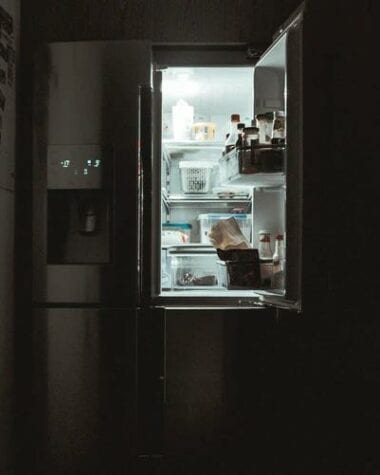Water is an essential resource that all of us need throughout our lives. Water is always present in our everyday routine, regardless of using it for drinking, cooking, washing, or other household chores.
Despite this, most people need to consider the overall quality of the water they have in their homes. Although the United States has one of the healthiest supplies of water for drinking throughout the planet, approximately 7.2 million Americans become ill annually due to diseases transferred through water.
This is partly because most individuals need to become more familiar with the value of having a water filtering system in their house. And water that has not been filtered may include impurities that can be dangerous to the health of everyone around you.
Regardless of whether your refrigerator comes with a water filter or you’re considering a built-in water filter, you’re wondering if refrigerator water filters work.
In this article, we here at DaDongNY will review everything you need about refrigerator water filters. Are they worth purchasing? And, if so, how do you pick the best one for you?
But, First, What Exactly Is A Water Filter
If you’ve made it this far, we assume you are already familiar with the concept of a refrigerator filter. But, just in case, here’s a quick refresher for you.
A refrigerator filter is a device that purifies the water that flows into your refrigerator. Most refrigerator filters are put in a specialized chamber within the equipment, although some have been installed at the water supply going to the refrigerator.
Activated carbon filters are commonly used in refrigerator filtration systems to eliminate chlorine taste and odors through a process referred to as adsorption.
How Does A Refrigerator Water Filter Work
A typical refrigerator filter incorporates sediment as well as activated carbon filtration. The sediment filter removes big particles that remain in the water, whereas the activated carbon filter attaches to particles by an adsorption process.
Chlorine is the most common contaminant eliminated through the carbon core of a fridge filter. When water travels over the carbon core, over 90% of the chlorine particles attach to the surface area of the carbon.
When the carbon can no longer hold excess particles, the filter becomes ineffective, and toxins may escape into the water as it travels through the filter. As a result, replacing a refrigerator water filter regularly is critical to keeping the odorless and clean-tasting features it offers.
Contaminants Is Removed By A Refrigerator Water Filter
Refrigerator filters are typically designed to filter out three specific contaminants: chlorine, Volatile Organic Compounds (VOCs), and lead. These have been proven to eliminate cysts as well as chloramine. But since most refrigerator filters have an average micron rating of around 20, tiny pollutants are not filtered.
The water usually travels over miles of pipes beneath the ground before arriving at your house. Lead from aging pipes, farm runoff, and other hazardous substances may have been collected along the path.
Waterborne illnesses like typhoid and dysentery are eliminated by the chlorine that disinfects drinking water by destroying bacteria, viruses, and parasites. However, it degrades the overall taste of water used for cooking and drinking. Carbon refrigerator filters are excellent for enhancing the flavor of chlorine-treated drinking water.
Chloramines are a chlorine-ammonia mixture used by towns to decrease the generation of toxic disinfection byproducts such as trihalomethane. There needs to be more research on the detrimental effects of chloramines, and the outcomes of those undertaken are inconclusive. Catalytic carbon fridge filters eliminate chlorine and chloramines by dividing the chlorine into ammonia and transforming the chlorine into chloride.
Volatile Organic Compounds are dangerous substances found in items such as paints, insecticides, and medications. Exposure to these contaminants can induce eye and throat irritation, liver and kidney damage, vomiting, and headaches. In addition to these symptoms, VOCs provide water with a disagreeable odor and flavor.
According to the EPA, around 20% of water used for drinking has been contaminated with VOCs. As a result, the EPA limits the levels of several distinct forms of VOCs in municipal water. The adsorption characteristics of activated carbon used in refrigerator filters bind to various VOCs, preventing them from escaping.
During the beginning of the twentieth century, lead was believed to be safe and beneficial in manufacturing paint, ceramics, and plumbing pipes. Before 1986, 50% of plumbing solder included lead.
Water is a wonderful solvent, which means it collects lead from ancient pipes and transports it to your faucet. A building built before the Safe Drinking Water Act (SDWA) will likely have lead pipes, soldered copper, and fixtures that might dissolve through your water.
Refrigerator Water Filter Being A Reliable Filtration Method
Refrigerator water filters are great at eliminating chlorine and chemicals that cause water to smell and taste awful, but that is about it. Even if you enjoy having a refrigerator featuring a water and ice dispenser, you should be aware that the water from it is not completely safe.
In short, a refrigerator water filter will remove chlorine from your water but will leave behind various substances, including heavy metals and other contaminants that the carbon within cannot remove.
Some of the contaminants which a refrigerator water filter is unable to eliminate from your water are as follows:
- aluminum
- arsenic
- barium
- cadmium
- copper
- fluoride
- mercury
- radium
- selenium
- Uranium
Aside from the contaminants mentioned above, the list does not stop there. The US EPA discovered a total of 80 contaminants that could be present in drinking water that can pose potential dangers to humans, with individuals with a weakened immune system facing a higher risk. Remember that these contaminants’ consequences can manifest within hours, days, or even years after a person ingests contaminated water.
Even if your body tries everything to defend itself against these harmful substances, it cannot deal with some extremely dangerous bacteria and viruses alone. As a result, regardless of whether you can’t see or taste pollutants in your water, you shouldn’t take its quality for granted.
The Pros And Cons Of Refrigerator Water Filters
Pros
In comparison to other types of water filtering, a refrigerator water filter has the following advantages:
- Great Convenience
Refrigerator water filters are the most efficient and convenient method of drinking filtered water. They quickly provide purified water at the touch of a button and filter the water that goes into the ice maker. Refrigerator water filters don’t need storage containers to accommodate slow filtration because of their high flow rate.
- High Flow Rate
Since refrigerator filters have a high flow rate, water can be filtered in real-time whenever the dispenser is triggered. This enables you to disperse any water you want at any moment.
- Simple Maintenance
A refrigerator water filter has to be changed every six months. While the mechanics of replacing a filter differ from refrigerator to refrigerator, the process generally consists of a simple installation and twisting to secure the filter in place. Before the compressed air can be used, it must be flushed through the filter with water.
- Improved Water Taste And Odor
A refrigerator water filter’s purpose is to enhance the flavor and odor of water. Chlorine is required for water disinfection because it kills bacteria, viruses, and parasites, making water taste bitter. Refrigerator filters lower chlorine levels in water, giving it a clean, crisp taste.
Cons
In contrast to other types of water filtration, refrigerator water filters possess the following downsides:
- Replacement Is Required On A Regular Basis
Refrigerator water filters must be replaced every six months to a year, and they can be costly for a filter just used for drinking water. Failure to replace your refrigerator filter might result in something worse than tap water. Therefore, regular replacement is essential.
- Significantly Raises The Cost Of The Refrigerator
Refrigerators with built-in water filters have more upfront expenses, which do not include the expense of filter replacement later on. Some consumers may buy a less-priced refrigerator without filters and install a separate filtering system underneath the sink.
- There Is Only One Filtration Stage
Several filtration systems have three or more stages. This provides for a greater reduction in the percentage of contaminants within the result. Refrigerator filters operate only in a single stage due to space constraints, preventing them from eliminating larger levels of the pollutants they remove.
- Ineffective At Eliminating Numerous Contaminants
Although refrigerator filters are great at removing contaminants, including chlorine, lead, and some VOCs, they do not remove fluoride, microplastics, arsenic, heavy metals, bacteria, and viruses. Microbial contaminants are not a problem if your household gets city-treated water unless you are under a boil water advisory. Other filtering systems, including reverse osmosis and water distillers, will purify water more effectively than refrigerator filters. However, a refrigerator water filter will make water taste better than it would from the tap.
How To Select The Perfect Refrigerator Water Filter
We’re assuming you’re interested in acquiring a refrigerator water filter now that you’ve learned everything there is to know about them. However, remember that selecting the best one for you is essential. Choosing the correct refrigerator filter is fundamental for your family’s health and well-being. The choice you make must be determined by critical factors such as:
- Compatibility
The first thing you should be looking for when buying a water filter for your refrigerator is its compatibility. Contrary to a common misunderstanding, water filters are not identical in size, and only some fit some units. Since there are several types of refrigerator connectors, most filters are only suitable for a few refrigerator brands.
There are certain techniques to determine whether the filters are compatible with any type of refrigerator. The simplest method is to replace the old refrigerator water filter and check the model number. Alternatively, you can consult the refrigerator’s instructions manual, which contains the necessary information. Another option is to visit the company’s website to see which refrigerator water filters align with the brand’s refrigerator.
- Durability
The average lifespan of a refrigerator water filter is six months. Most filters require replacement after this period. This means the filter can offer every family 200 to 300 gallons of clean drinking water. Considering water filters are on the pricier side of the scale, purchasing refrigerator water filters in mass volume may be the right choice.
- Nsf Verification And Testing
Water filtration and other related consumer goods are certified and tested by NSF International to ensure they meet particular standards for quality, safety, and performance. They have their classifications for rating fridge water filters.
This certification method is useful, but you should also verify what contaminants they can eliminate and the number of filters. The NSF classifications for refrigerator water filters are as follows:
| CLASSIFICATION | DESCRIPTION |
| NSF 42 | The refrigerator water filter can eliminate chlorine-like contaminants and improve odor and taste. |
| NSF 53 | This refrigerator water filter can remove contaminants or particles such as asbestos, radon, mercury, arsenic, and others that could lead to medical conditions. |
| NSF 501 | These are the best-rated water filter products, and they can remove numerous dangerous substances from drinking water, such as over-the-counter and prescription medicines, pesticides, herbicides, detergents, and other chemical substances. |
- Additional Things To Consider
Another significant aspect is the number of potentially hazardous substances or chemical compounds these filters add to the filtration system. Some NSF certifications show harmful compounds not contained in filtered water by particular filters.
Here are some filters that are free of hazardous compounds:
| CLASSIFICATION | DESCRIPTION |
| NSF 372 | These filters do not introduce lead into the filtered water. |
| NSF 61 | This rating indicates that the filter does not emit harmful substances that enter the filtered water. |
- Installation
Many refrigerator water filters are easy to install and slide directly into the refrigerator compartment. When the lid is twisted, locked into a receptacle, or closed, the filters can be inserted through the socket or locked into position.
The ease of installation is critical to make sure the door to the refrigerator is kept closed for long amounts of time and that users may easily replace the water filter.
Despite the easy installation, preparing the refrigerator water filter can prove complex and time-consuming. The last step in the installation is to pass 4 liters of water across the filter’s chamber before it is safe to use. This can be a time-consuming phase in which you must return to the sink to drain the water.
FAQs
- Do Water Filters In Refrigerators Eliminate Fluoride?
Unfortunately no, refrigerator filters can’t remove fluoride from water. Fluoride is added to drinking water by water-treatment facilities to help prevent cavities and improve general dental health.
However, there are potential hazards associated with excessive fluoride use. The hazards include joint discomfort, discolored teeth, muscle damage, stiffness, hypothyroidism, and impaired IQ.
If you are concerned about fluoride, you will need to utilize a more powerful filtration method, like as a result of reverse osmosis or distillation.
- Is It Possible To Become Sick From Old Refrigerator Water?
Refrigerator filters are designed to work on water that is already microbiologically safe. For viruses and pathogens, city water has previously been chemically treated. However, if you keep using your old filter after a year, the water from your faucet may be contaminated with all of the previously blocked toxins. An outdated filter provides ideal living conditions for organisms that might enter your intestines, creating flu-like symptoms.
- How Frequently Should You Change The Water Filter In Your Refrigerator?
Replace refrigerator filters every six months. A filter should never be left in place for more than a year. The more often you use a carbon filter past its optimum capacity, the more contaminated your water may get.
Here’s what may occur if you fail to replace the water filter in your refrigerator:
- It eventually stops filtering because it becomes too clogged with debris and dirt. Once the water stops flowing out of your filter, you know it’s time to change it.
- Regardless of whether the surface area of the filter is full, water keeps flowing past it, carrying pollutants with it. When all gaps within the old carbon filter are filled, particles accumulate or flow through the filter.
- A stacked carbon filter accumulates particles from which live organisms eat and serves as a bacterial campground.
- Is Filtered Refrigerator Water Equally Good As Bottled Water?
The bottled water’s quality determines this. The majority of refrigerator water filters are only capable of eliminating one type of contaminant from water. While this enhances the flavor of water, it will make it taste different from purified bottled mineral water or even spring water. To accomplish those results, you’ll need a more complex filtration system.
Bottomline
As we conclude this article’s end, we can conclude that refrigerator water filters are well worth the money spent on them. There are benefits and drawbacks to having them, but as long as you choose the correct water filter product, you can ensure the general safety of everyone in the home.
If you’re looking for a new replacement water filter or want to know what this device does in your water and ice dispenser, we hope this information is useful.
To learn more about refrigerators and how this valuable piece of equipment chills the food and beverages inside, including your breast milk, check out the post here.
Articles You May Be Interested In
- A Cooler Choice: Whirlpool v.s GE Refrigerators (Full Guide)
- Refrigerator Check: LG v.s Samsung Refrigerators (Full Guide)
- Cool Tech Showdown: Frigidaire v.s Whirlpool Refrigerators (Full Guide)
- Fridge Favorites: Bosch v.s LG Refrigerators (Full Guide)
- Cooling Conundrum: Whirlpool v.s Samsung Refrigerators (Full Guide)
- Tale Of The Tape: Maytag v.s Whirlpool Refrigerators (Full Guide)
- Fridges in Focus: Thermador v.s Sub-Zero Refrigerators (Full Guide)
- Fridge Frenzy: Sub-Zero v.s Viking Refrigerators (Full Guide)
- The Big Chill: Whirlpool v.s KitchenAid Refrigerators (Full Guide)
- Refrigerator Bout: Whirlpool v.s LG Refrigerators (Full Guide)









